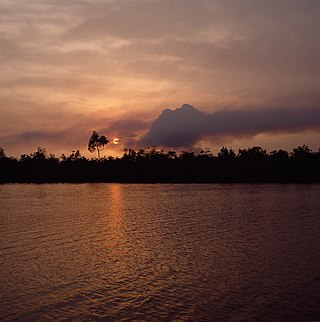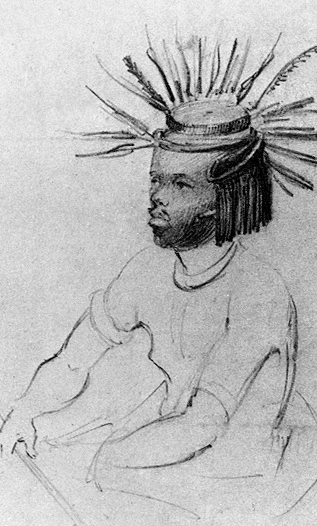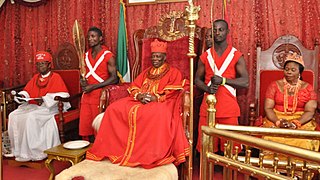Related Research Articles

A dynasty is a sequence of rulers from the same family, usually in the context of a monarchical system, but sometimes also appearing in republics. A dynasty may also be referred to as a "house", "family" or "clan", among others.

The Ijaw people, otherwise known as the Ijo people, are an ethnic group found in the Niger Delta in Nigeria, with significant population clusters in Bayelsa, Delta, and Rivers. They also occupy Edo, Ondo, and small parts of Akwa Ibom. Many are found as migrant fishermen in camps as far west as Sierra Leone and as far east as Gabon. They account for about 1.8% of the Nigerian population according to CIA Factbook. The Ijaws are one of the most populous tribes inhabiting the Niger Delta region and the eighth largest ethnic group in Nigeria.

Bayelsa is a state in the South South region of Nigeria, located in the core of the Niger Delta. Bayelsa State was created in 1996 and was carved out from Rivers State, making it one of the newest states in the federation. The capital, Yenagoa, is susceptible to high risk of annual flooding. It shares a boundary with Rivers State to the east and Delta State to the north across the Niger River for 17 km and the Forçados River for 198 km, with the waters of the Atlantic Ocean dominating its southern borders. It has a total area of 10,773 square kilometres (4,159 sq mi). The state comprises eight local government areas: Ekeremor, Kolokuma/Opokuma, Yenagoa, Nembe, Ogbia, Sagbama, Brass and Southern Ijaw. The state is the smallest in Nigeria by population as of the 2006 census. Being in the Niger Delta, Bayelsa State has a riverine and estuarine setting, with bodies of water within the state preventing the development of significant road infrastructure.

The Mpondo People or simply Ama-Mpondo, is one of the kingdoms in what is now the Eastern Cape. Having been established way back in 1226. The Ama-Mpondo Nation were first ruled by its founder who was King Mpondo kaNjanya who lived around and later the 'Ama-Nyawuza'clan, by nationality referred to themselves as 'Ama-Mpondo'. They are related to other Aba-Mbo kingdoms and chiefdoms in South Africa.
Bonny Island is situated at the southern edge of Rivers State in the Niger Delta region of Nigeria near Port Harcourt. Ferries are the main form of transport, though recently an airstrip has been built and it’s fully functional - with flights from Lagos, Abuja and Port Harcourt respectively to and from the island. The local dialect spoken in Bonny Island is Ibani, an Ijaw language.

Isoko South is a local government area (LGA) in the Isoko region of Delta State, Nigeria. With its headquarters at Oleh, Nigeria, it is one of the two local governments that make up the Isoko region. The other is Isoko North, which has its headquarters at Ozoro.

Okpe is a kingdom in Delta State, Nigeria. Today, it is also the name of a local government area. It is one of the many kingdoms that make up Urhobo nation. Its capital is Orerokpe. The kingdom plays host to the Osubi Airport, which is actually located at Osubi and the Delta State Trade Fair Complex. The Orodje celebrated ten years on ancestral throne. Major General Felix Mujakperuo is the king of Okpe Kingdom. The kingship is usually rotated between the four ruling houses.
Enhwe is a kingdom made up of two main sections which are Otu Enhwe and Uluthe with its center of administration in Uluthe where the Paramount Rulers Emanates from. Enhwe Kingdom in Isoko South migrated from IDU (now Benin) during the end of the 13th Century. Its founder was Oviota Oriro, son of the third Ogiso, in the first Benin dynasty. He was denied the rights to becoming the next King. As a result of this, he ran away from Benin leaving with some loyal followers. Amongst his followers were Uvie, Ediagbon, Ekedi, Afia, Okpolo and many others. They had a brief sojourn at Jesse and later left as a result of war threats from the Oba. They found Uri; a place located in the present-day Isoko South LGA. After a while, they left and settled in their present location, Uruchie, where Oviota Oriro became the first King in 1235 AD.
The Western Apoi tribe live in Ondo State, Nigeria. The tribe consists of nine settlements: Igbobini, Ojuala, Ikpoke, Inikorogha, Oboro, Shabomi, Igbotu, Kiribo and Gbekebo. The Apoi inhabit higher ground than most of the other Ijaw tribes. They speak a southeastern dialect of the Yoruba language called Apoi which is not very different from the Ikale dialect. The Apoi might have undergone a linguistic shift centuries ago from an Ijo based dialect to Yoruba due to intermarriages with the Ikale, and isolation from the Niger Delta due to their location inland and away from the main body of Ijo people. They are bordered to the north and east by the Ikale and to the west by the Ilaje. The clan shares the southern border with the Arogbo.
The Engenni people live in the Niger Delta region of Nigeria. They are considered to be Edoid based on linguistic grounds. They live in close proximity with Ijaw people. They primarily live in Ahoada west local government area of Rivers state, Nigeria. Although they consider themselves to be Engenni, the Engenni speak an Edoid language. Alagoa (2003) said: “---The penetration of the Niger-Delta by Edoid groups extends to the Epie-Atissa and Engenni of the central and Eastern Niger-Delta----The Epie, along with the Ogbia and other groups of the central and eastern Niger-Delta, are historically united with the Ijaw.” The other groups of the central and eastern Niger-Delta which Professor Ebiegberi Alagoa said that were historically united with the Ijaw, include the Engenni, as shown from his narrative above. The Engenni have close relations with neighbouring Ijaw tribes such as the Zarama and Epie-Atissa.
The Kabo tribe of the Izon people lives in the vicinity of Patani in Delta State, Nigeria. The tribe gets its name from its founder, Kabo, and from Kabobolou Creek. Two Kabo towns are located along the creek. Other Kabo settlements include: Patani, Elemebiri (Ofonibeingha), Asamabiri, and Ekperiwari.
Ogbia is a traditional Kingdom and Local Government Area of Bayelsa State in the Niger Delta region of Nigeria. The headquarters of both the Traditional Kingdom and Local Government is located in Ogbia Town at 4°39′00″N6°16′00″E.
The Owu sub-ethnicity is a part of the Yoruba people of West Africa. Ago-Owu in Abeokuta is where the Owus are mostly concentrated, however large Owu settlements are found throughout Yorubaland. The Yoruba confederacy of kingdoms extends beyond the boundaries of Nigeria into the Republic of Benin and Togo.
The Kingdom of Bonny, otherwise known as Grand Bonny, is a traditional state based on the town of Bonny in Rivers State, Nigeria. In the pre-colonial period, it was an important slave trading port, later trading palm oil products. During the 19th century the British became increasingly involved in the internal affairs of the kingdom, in 1886 assuming control under a protectorate treaty. Today the King of Bonny has a largely ceremonial role.
Henry Seriake Dickson CON is a Nigerian lawyer and politician. He is the Senator representing Bayelsa West since 2020 in the 9th National Assembly. He was the governor of Bayelsa State from 14 February 2012 to 14 February 2020. He was a member of the House of Representatives from 2007 until 2012.
The Agbon Kingdom is one of twenty-four subunits of the Urhobo people that have been in existence since before the rise of the Benin Empire in the 1440s and before the arrival of the Portuguese in the Western Niger Delta in the 1480s.
Okpara Inland is a community located in the Ethiope East local government area of Delta State Nigeria. This community is a progeny of the Agbon Kingdom. Local history has it that it is the first son of Agbon whose traditional seat of leadership is Isiokolo. The previous king of the community, now deceased, HRM Chamberlain Oyibocha Orovwuje, Ogurimerime Okpara I, used this community as his centre of leadership bypassing the ancient satellite of Isiokolo.
The Idama (E'dama) clan of the Ijaw people lives in central Rivers state, Nigeria. This small clan is sometimes classified as a Kalabari tribe clan rather than as its own clan.
Christopher 'Pere' Ajuwa was the first man from the Niger Delta region of Nigeria to run for the office of the President of Nigeria. He was an astute businessman during the 1980s and 1990s, and was best known for his humanitarian benefactions.
The Unyeada Kingdom, sometimes referred to as "Ayanda" a corrupted version of Unyeada, some literal version interpreted it as "prowess of Edabiri". Unyeada is an ancient riverine settlement (Kingdom) located in western part of Obolo Land, administratively in Andoni Local Government Area of Rivers State, Nigeria. Situated in the south of Ogoni tribe and Kingdom of Bonny to the west and Eastern Obolo to the east. Unyeada territory stretches from Iburubu Sea near the mouth of Andoni River to Okwan Obbu or Imo River.
References
- ↑ Ebikawei Onos Timi, (2005). A History of the Niger Delta, Port Harcourt: Ebikawei timi Research Publications. ISBN 978-37314-5-9